In the realm of financial regulations, compliance with Know Your Customer (KYC) and anti-money laundering (AML) requirements stands as a cornerstone for businesses, particularly in the financial sector. Embracing the principles of know-your-customer (KYC) processes, organizations navigate a landscape governed by regulations like the Bank Secrecy Act and the Patriot Act, overseen by bodies such as the Financial Crimes Enforcement Network (FinCEN). Central to this compliance framework is customer due diligence (CDD), with a critical distinction made for enhanced due diligence (EDD) when dealing with higher-risk customers.
Understanding Enhanced Due Diligence (EDD)
In the dynamic milieu of modern finance, a standardized approach to due diligence proves impractical. Hence, businesses must calibrate their diligence efforts to match the risk posed by each customer. While routine CDD suffices for lower-risk clients, those deemed higher risk necessitate the deeper scrutiny afforded by EDD. By grasping EDD principles and its requisite application, organizations not only fortify their AML compliance but also streamline their CDD and KYC processes.
Risk-Based KYC Strategies
Contemporary KYC regulations pivot on a risk-centric paradigm, tailoring requirements based on the perceived risk level. KYC entails three primary components:
1. Customer Identification: Gathering essential information like name, address, and identification number.
2. Customer Due Diligence: Verifying identity, understanding beneficial ownership, scrutinizing business purposes, and assessing money laundering risks.
3. Ongoing Transaction Monitoring: Continuously assessing customer activity for suspicious patterns.
During CDD, businesses evaluate customers to gauge their risk profile, employing identity verification and background checks to screen for illicit connections or activities. However, when clients pose heightened risks, necessitating closer scrutiny, businesses invoke EDD protocols.
Identifying EDD Candidates
A myriad of circumstances may trigger the need for EDD, encompassing:
– High net-worth individuals
– Cash-intensive businesses
– Anonymity or complexity in business relationships
– Entities from jurisdictions with weak AML regulations
– Entities from sanctioned countries
– Politically exposed persons (PEPs)
– Businesses susceptible to money laundering, such as gambling establishments
Upon establishing relationships with such high-risk entities, businesses delve deeper into due diligence, employing rigorous investigative methods to glean comprehensive insights.
Elements of Enhanced Due Diligence
EDD delves into customer relationships with a meticulous eye, uncovering risks often overlooked in standard CDD. To uphold AML compliance, financial institutions conduct exhaustive investigations, collecting substantial evidence and ensuring meticulous documentation.
A robust EDD process demands:
– Comprehensive customer information, including occupation, asset volumes, and media coverage.
– A clear understanding of the business relationship’s purpose.
– Thorough scrutiny of fund sources or wealth origins.
– Insight into transaction motivations and histories.
Crucially, EDD procedures mandate thorough documentation, enabling regulatory scrutiny and ensuring transparency in decision-making processes.
Implementing EDD Measures
The implementation of EDD entails meticulous data collection, encompassing customer aliases, corporate records, media mentions, and legal histories. It demands significant time investment and expertise, making it a substantial undertaking for compliance-minded organizations.
Ahrvo Comply offers a streamlined solution for EDD, empowering users with an AML Compliance Solution that expedites risk scoring and EDD report generation, cutting time and costs by 70%.
In conclusion, mastering EDD is indispensable for navigating the complexities of AML compliance. By embracing robust EDD practices, businesses safeguard against financial risks while bolstering regulatory adherence. Contact Us to learn more about Ahrvo Comply.







